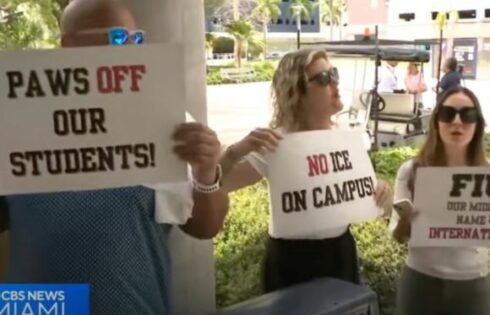
Business professor identifies ‘bloated bureaucracy’ as one cause
Colleges have lost 1.3 million students in the past two years according to a report from the National Student Clearinghouse Research Center.
According to the survey, college enrollment has decreased since the start of the COVID shutdowns with a 3.5 percent drop last spring semester and a 4.1 percent drop this most recent semester.
This adds to an overall 9.4 percent decrease or 1.3 million enrollment drop since the spring 2020 semester before COVID lockdowns began.
The study reported that public colleges and universities as well as community colleges suffered the greatest decrease in enrollment rates.
A management professor at Drexel University’s LeBow College of Business is not surprised by the results.
“Bloated bureaucracy on the campuses along with a perceived decline in seriousness and courage by university administrations give people pause,” Stanley Ridgley told The College Fix via email. He said Americans are asking if college is worth it and answering “no.”
He is writing a book about reforming the universities titled “Brutal Minds.”
The National Student Clearinghouse Research Center did not identify if these students simply dropped out of college or chose other career options such as trade school.
MORE: Feminists upset because Purdue president boasted of male enrollment
The College Fix asked the think tank if it recorded what path these students chose to follow instead of attending college and if its researchers expected the decline to continue in the coming year.
The Fix did not receive a response to two messages, one sent through the center’s website and another to its Twitter in the past two weeks.
While it remains unclear what these 1.3 million former students are doing now, The Fix asked Professor Ridgley if society and policy makers should be concerned about this drop in enrollment.
“In terms of maintaining a well-educated, skilled populace to keep a complex industrial economy running, sure we should be concerned that fewer Americans are opting for college,” Ridgley told The Fix.
However, with high tuition rates, Ridgley understands why people may be hesitant to attend college especially when the, “payout for a college education…just isn’t what it used to [be].”
The most important point that matters is that students have a plan, Ridgley stated.
“It surely matters that every young person has a plan for the long-term future—this is what it means to be a strategic thinker,” he told The Fix. “We visualize where we want to be in five years, and we then chart a path to get there as best we can.”
Students do not need college to succeed, professor says
Students do not need college to be successful in life because success is subjective to each person, Ridgley stated.
“College can certainly provide you with the best of that vast breadth and depth of what scholars have said, written, and thought….but it can also take up time and money in frivolous fads and pseudoscientific nonsense,” he told The College Fix.
“It’s really no secret what universities should do,” the business professor stated, when asked how colleges can attract students.
First they must lower tuition prices which “means cutting back on administrative bloat, that army of paper pushers that add cost to the college without any real value-added.”
“Make colleges partners with their students in guaranteeing that student assistance loans are repaid,” Ridgley added.
Next, return the public’s faith in the higher education institutions.
This can be done by “abandoning…The perception that modestly educated and malignly motivated bureaucrats are running the university, rather than the faculty,” and “return to normalcy, tradition, rigor, high objective standards and a no-nonsense way of educating the next generation,” the Drexel professor told The Fix.
MORE: Female enrollment rises, male enrollment drops
IMAGE: wk1003mike/Shutterstock.com
Like The College Fix on Facebook / Follow us on Twitter






Please join the conversation about our stories on Facebook, Twitter, Instagram, Reddit, MeWe, Rumble, Gab, Minds and Gettr.